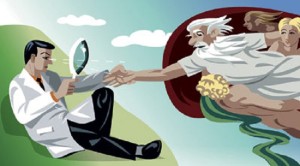 I kick off this segment with a news item that perfectly represents a topic I’ve wanted to talk about. The article appeared in this week’s issue of the New York Times Science section under the title, The Stuff of Those Visions in Clinical Death, and told of an experiment done at the University of Michigan seeking to find a physical explanation for the visions, often of an afterlife, reported by about 20% of victims of cardiac arrest who live to tell about it.
I kick off this segment with a news item that perfectly represents a topic I’ve wanted to talk about. The article appeared in this week’s issue of the New York Times Science section under the title, The Stuff of Those Visions in Clinical Death, and told of an experiment done at the University of Michigan seeking to find a physical explanation for the visions, often of an afterlife, reported by about 20% of victims of cardiac arrest who live to tell about it.
Using nine poor, innocent rats 🙁 in whom they “induced cardiac arrest,” researchers observed that within thirty seconds after death the rats’ information-processing brain waves multiplied eight times and sensory processing brain waves multiplied five times.
These findings contradict the accepted thinking that brain activity ceases after clinical death, which then has implications for theories of near death experiences.
Are the experiences merely a subjective experience of the brain’s last gasp to revive itself? Or are they glimpses of another dimension of reality, even indeed the next life?
These questions capture a larger argument being waged in the culture at large, between advocates for of a religion-based view of the world and advocates of a science-based view. In our culture that means a struggle between the conservative worldview (amber/orange) and the scientific liberal (orange/green) worldview.
Last week we saw two intellectual heavyweights enter the fray. The first volley was served by Stephen Pinker, author of The Better Angels of Our Nature: Why Violence Has Declined, which I hold as one of the most important books of recent times. He published an article in this month’s issue of the New Republic, defending a worldview where science trumps religion and advocating a “efflorescence of new ideas from the sciences” to reinvigorate the humanities (art, philosophy, anthropology etc).
He was countered the next day by another leading intellectual, the conservative columnist for the New York Times, Ross Douthat. Douthat is the author of Bad Religion: How We Became a Nation of Heretics, a defense of traditional Christian values and a critique of modern biblical scholarship and post-modern “God within” spiritual movements.
An adult convert to Catholicism, Douthat represents the stream of conservative intellectual thought that dates the arc of progress from the birth of Jesus. Pinker, on the other hand, emphasizes the tremendously civilizing forces brought on by science 1500 years later, forces that not only alleviated material poverty but also radically accelerated moral development.
They’re both right, of course, and integral theory helps us to see the huge cultural leaps forward brought by the advent of both Traditionalism and Modernity each in their turn.
Though I admire the intellectual prowess of both Pinker and Douthat, and recognize pieces of great truth in both their perspectives, I also find it both amazing and a bit tedious that the argument in the mainstream intelligentsia has gone no further.
So to fix that I invited my dear evolutionary brother Michael Dowd to join me on the call for our own contest of theories. Michael is the author of Thank God for Evolution, and as you may sense from his title, he is bringing forth an essentially religious interpretation of science, with a core doctrine of God as Reality. Working with his wife, science writer Connie Barlow, Michael’s message transmits passion, beauty and true transcendence, and even the expansive uplift one finds in traditional religious experience. It’s a powerful new kind of ministry that is getting increasing traction in the culture. I am a huge fan of his mission and of Michael as its unabashed evangelist.
But he and I have one important philosophical difference, which engages the same territory contended by Pinker and Douthat. Michael draws the line at a personal God who created the universe and who operates outside it (“We have no evidence for that,” he says).
And I, on the other hand, jump right on over that line.
In our dialogue you’ll hear me argue for a personal Divine who is ontologically real (that is real whether one believes in him/her or not), who sees us and loves each of us particularly, who is calling us forward to conscious unity, and with whom we can have an I-Thou, trans-mythic, personal relationship.
Michael and I have a good go at each other for about forty minutes, then take a poll of listeners to see who “won” the argument. The result: Michael victorious by nearly two to one.
God help me!
Check of more from Michael Dowd at his websites: thegreatstory.org and michaeldowd.org.
Listen to an excerpt below. The full audio is premium content on integrallife.com.
Podcast: Download
Subscribe: Google Podcasts | RSS





